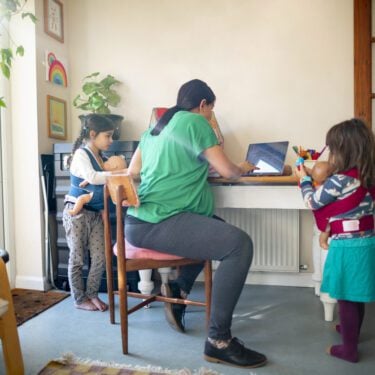
07/04/20
4 min read
The Nuffield Foundation has awarded £4 million in research funding to six research teams across five UK Universities to improve the lives of people living with musculoskeletal (MSK) conditions by influencing policy and practice.
Musculoskeletal conditions – including arthritis and back pain – affect 18.8 million people in the UK and are the leading contributor to disability in the UK. One in five people in England consult a GP about a musculoskeletal condition every year, which accounted for the third largest area of NHS England programme spending at £4.7 billion in 2013-14.
Despite the huge number of people living with MSK conditions in the UK, there is a lack of evidence on how these conditions progress and their effect on people’s well-being and life chances. Together, the new, interdisciplinary research projects will address this by exploring the impacts of MSK conditions on different aspects of well-being. The research projects will create new datasets as well as exploiting existing data in new and innovative ways.
The research grants are the first to be awarded from the Nuffield Foundation’s dedicated £12.5 million fund for research into MSK conditions.
About the research projects
We have awarded funding to two projects in partnership with the charity Versus Arthritis, who have contributed £250,000 towards the grants.
These two projects will link existing, and new, data in novel ways, to address key research questions and inform policy and practice:
- Assembling the data jigsaw in Greater Manchester led by Professor Will Dixon (University of Manchester). Awarded £1.5 million over four years.
There is currently no national system to record MSK diagnoses and progression. Professor Dixon’s team will draw together data regarding diagnosis and treatment by GPs and rheumatologists in Greater Manchester, social care records, information collected from patients via touch screens in hospital waiting areas, and social media content. This innovative data linking will enable the team to better understand how common MSK conditions are, how they progress, what treatments are best and who needs which services and when.
- Integrating enriched, longitudinal multi-level data in North Staffordshire and Stoke on Trent led by Professor George Peat (Keele University). Awarded £1.3 million over five years.
This project aims to improve MSK health care quality through a novel and scalable approach to linking data across North Staffordshire and Stoke-on-Trent. Rich datasets will be created from primary care records, MSK community service providers and, crucially, surveys of MSK patients and the wider population. This will enable researchers to better understand the extent of inequalities in musculoskeletal health and the impact of service redesign. The team will also produce health intelligence reports to inform decision-makers and service providers.
Three projects will generate new knowledge, linking existing data sets to explore the causes and consequences of MSK (funded exclusively by the Nuffield Foundation):
- Geographical mapping of prevalence and outcomes in MSK conditions across Wales and Scotland led by Dr Rosemary Hollick (University of Aberdeen). Awarded £377,000 over two years.
Rural areas present a significant challenge to delivering timely and equitable healthcare. Currently we don’t understand how MSK is impacted by living rurally. Focusing on Wales and Scotland, this project will link healthcare records to understand the extent of geographical differences in the prevalence and outcomes of those living with MSK conditions, and factors driving such differences. The team will also survey MSK patients in rural and urban areas about their care to make recommendations for policy. An interactive tool will be developed to allow decision makers to better understand how geographical differences impact on MSK outcomes.
- How does arthritis affect earnings over time? Longitudinal evidence from three UK panel datasets led by Dr Adam Martin (University of Leeds). Awarded £181,000 over two years.
Arthritis affects people’s lives in many ways, including job loss, early retirement, an inability to find appropriate work or a lack of career progression. This project will track the earnings of people of working age with arthritis compared to those who don’t using existing data from over 60,000 people. The study will estimate the loss of earnings for individuals of having arthritis, who is impacted most, and then scale up to look at implications for the whole UK economy. This evidence-base will help decision makers to target future interventions.
- The impact of MSK conditions on outcomes of other illnesses: a linked electronic health records survey, led by Dr John Edwards (Keele University). Awarded £350,000 over two years.
People with MSK often have other illnesses which health professionals prioritise as they feel they are more serious. This project will identify whether having MSK, and the pain that accompanies it, leads to worse outcomes for those with heart attack, stroke, pneumonia, dementia, or cancer. The project will use data collected from the large UK wide database of general practice records, hospital records and mortality data. If the link is identified, better management strategies before and during hospital admission for these other illnesses could reduce MSK related pain, improve function and lead to better patient outcomes.
A final project will generate new data to inform patient decision making:
- Understanding and improving decision making for joint replacement surgery in older patients with complex health needs, led by Professor Alan Silman (University of Oxford). Awarded £286,000 over three years.
Weighing up the risks and benefits when deciding whether to have a joint replacement is not straightforward for older people who have knee osteoarthritis. Researchers will conduct in-depth interviews with 60 people aged 70 or over, from locations across England, who have been referred for possible surgery for severe knee osteoarthritis, and who have other health conditions. The team will then develop a patient-friendly resource for the Healthtalk website to help patients, their carers and health professionals decide whether surgery is the best option for them.
As with much of the research we fund, the timescale and nature of these projects may be affected by the COVID-19 pandemic. We are an open, collaborative and engaged funder and our aim is to support the research community to deliver successful projects that have a positive impact on people’s lives.
Funding for these projects comes from the Nuffield Foundation’s Oliver Bird Fund, bequeathed by Captain Oliver Bird of Bird’s Custard fame in 1948 to invest in rheumatic disease research.
The Nuffield Foundation is committed to improving people’s lives through better understanding of the issues affecting their life chances. Together these new projects will improve our understanding of the impact of MSK conditions on both individuals and wider society. We are delighted to be partnering with Versus Arthritis to help improve the health and well-being of people living with MSK conditions by influencing future practice, policy and research.Tim Gardam, Chief Executive of the Nuffield Foundation
This is exceptional research that will greatly improve our understanding of the effects of arthritis and improve the way people are treated. Meaningful data are key to providing high value musculoskeletal services as it’s essential for understanding the health needs of local populations, the activity performed by services and the outcomes they deliver. Our partnership with the Nuffield Foundation is an excellent example of how working with others can maximise the impact of research funding and allow us to achieve more than we could do on our own.Amanda Neylon Director of Insight Data and Technology at Versus Arthritis















































